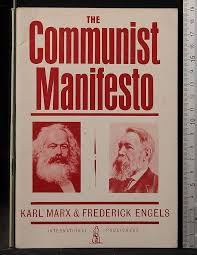The Essential Books by Karl Marx
Karl Marx, the renowned philosopher, economist, and revolutionary socialist, is best known for his influential works that have shaped political thought and economic theory. Here are some essential books by Karl Marx that every avid reader and scholar should explore:
“The Communist Manifesto”
Co-authored with Friedrich Engels, this seminal work outlines the principles of communism and critiques capitalism. Published in 1848, “The Communist Manifesto” remains a cornerstone of Marxist ideology.
“Das Kapital”
This monumental work delves into the critique of political economy, analysing the capitalist mode of production and its implications on society. Divided into three volumes, “Das Kapital” offers profound insights into economic structures and class struggle.
“The Poverty of Philosophy”
In this critical response to Pierre-Joseph Proudhon’s “The Philosophy of Poverty,” Marx expounds on his materialist conception of history and critiques Proudhon’s anarchist ideas. “The Poverty of Philosophy” is a key text in understanding Marx’s philosophical framework.
“Critique of the Gotha Programme”
This work addresses key issues within the German Social Democratic Party and offers a critique of its political programme. Marx emphasises the importance of class consciousness and the transition to a communist society based on equality.
These are just a few examples of Karl Marx’s essential works that continue to provoke thought and inspire critical analysis in various fields. Delve into these texts to gain a deeper understanding of Marx’s revolutionary ideas and their enduring relevance in today’s world.
Unveiling Marxian Thought: 7 Essential Reads from ‘The Communist Manifesto’ to ‘The Poverty of Philosophy’
- Start with ‘The Communist Manifesto’ for a concise overview of Marx’s ideas.
- ‘Das Kapital’ is Marx’s major work on political economy, delve into it for in-depth analysis.
- Read ‘The German Ideology’ to understand Marx’s views on ideology and social structure.
- ‘Critique of the Gotha Program’ offers insights into Marx’s thoughts on socialism and communism.
- ‘Capital
- Explore ‘Grundrisse’ for early drafts and outlines of Marx’s economic theories.
- Consider reading ‘The Poverty of Philosophy’ for a critique on Pierre-Joseph Proudhon’s work.
Start with ‘The Communist Manifesto’ for a concise overview of Marx’s ideas.
Begin your exploration of Karl Marx’s profound ideas by immersing yourself in “The Communist Manifesto.” This iconic work, co-authored with Friedrich Engels, provides a concise and powerful overview of Marx’s foundational principles on communism and his critique of capitalism. “The Communist Manifesto” serves as an excellent starting point for delving into Marx’s revolutionary thoughts and understanding the core concepts that underpin his influential body of work.
‘Das Kapital’ is Marx’s major work on political economy, delve into it for in-depth analysis.
“Dive into ‘Das Kapital,’ Karl Marx’s seminal work on political economy, for a comprehensive and profound analysis of capitalist society. This monumental piece of literature offers invaluable insights into the workings of the capitalist mode of production, class struggle, and the dynamics of economic systems. By exploring ‘Das Kapital,’ readers can gain a deeper understanding of Marx’s critique of capitalism and his vision for a more equitable and just society.”
Read ‘The German Ideology’ to understand Marx’s views on ideology and social structure.
For a comprehensive insight into Karl Marx’s perspectives on ideology and social structure, delving into his work ‘The German Ideology’ is essential. In this seminal text, Marx critically analyses the role of ideology in shaping societal beliefs and structures, highlighting the interconnectedness between ideas and material conditions. By exploring ‘The German Ideology,’ readers can grasp Marx’s nuanced understanding of how ideological constructs influence social relations and power dynamics, offering valuable reflections on contemporary issues of class struggle and societal transformation.
‘Critique of the Gotha Program’ offers insights into Marx’s thoughts on socialism and communism.
“Critique of the Gotha Programme” provides valuable insights into Karl Marx’s thoughts on socialism and communism. In this work, Marx critically examines the political programme of the German Social Democratic Party, emphasising the importance of class consciousness and advocating for a transition towards a truly egalitarian communist society. Through his analysis, Marx offers profound reflections on the challenges and possibilities of achieving a more just and equitable social order based on principles of solidarity and equality.
‘Capital
“Capital” by Karl Marx is a profound and comprehensive analysis of the capitalist system, exploring the dynamics of production, labour, and exploitation within a capitalist society. This seminal work offers a critical examination of the economic structures that underpin modern industrial societies, shedding light on issues of class struggle, alienation, and the accumulation of wealth. Through meticulous research and incisive commentary, Marx’s “Capital” remains a cornerstone of economic theory and political thought, providing invaluable insights into the complexities of capitalism and its impact on society.
Explore ‘Grundrisse’ for early drafts and outlines of Marx’s economic theories.
For a deeper insight into Karl Marx’s economic theories, exploring ‘Grundrisse’ is essential. This work offers early drafts and outlines of Marx’s groundbreaking ideas, providing a glimpse into the evolution of his economic thought process. By studying ‘Grundrisse,’ readers can uncover the foundational concepts that laid the groundwork for Marx’s later works, such as ‘Das Kapital.’ It serves as a valuable resource for understanding the development of Marx’s economic theories and the intricate analysis of capitalist society that he is renowned for.
Consider reading ‘The Poverty of Philosophy’ for a critique on Pierre-Joseph Proudhon’s work.
For a thought-provoking analysis of Pierre-Joseph Proudhon’s ideas, readers should delve into Karl Marx’s “The Poverty of Philosophy.” In this work, Marx offers a critical examination of Proudhon’s philosophical stance, presenting his own materialist perspective and highlighting the differences between their ideologies. “The Poverty of Philosophy” serves as a valuable resource for understanding the intellectual debates and theoretical disagreements that shaped the landscape of 19th-century political thought.

